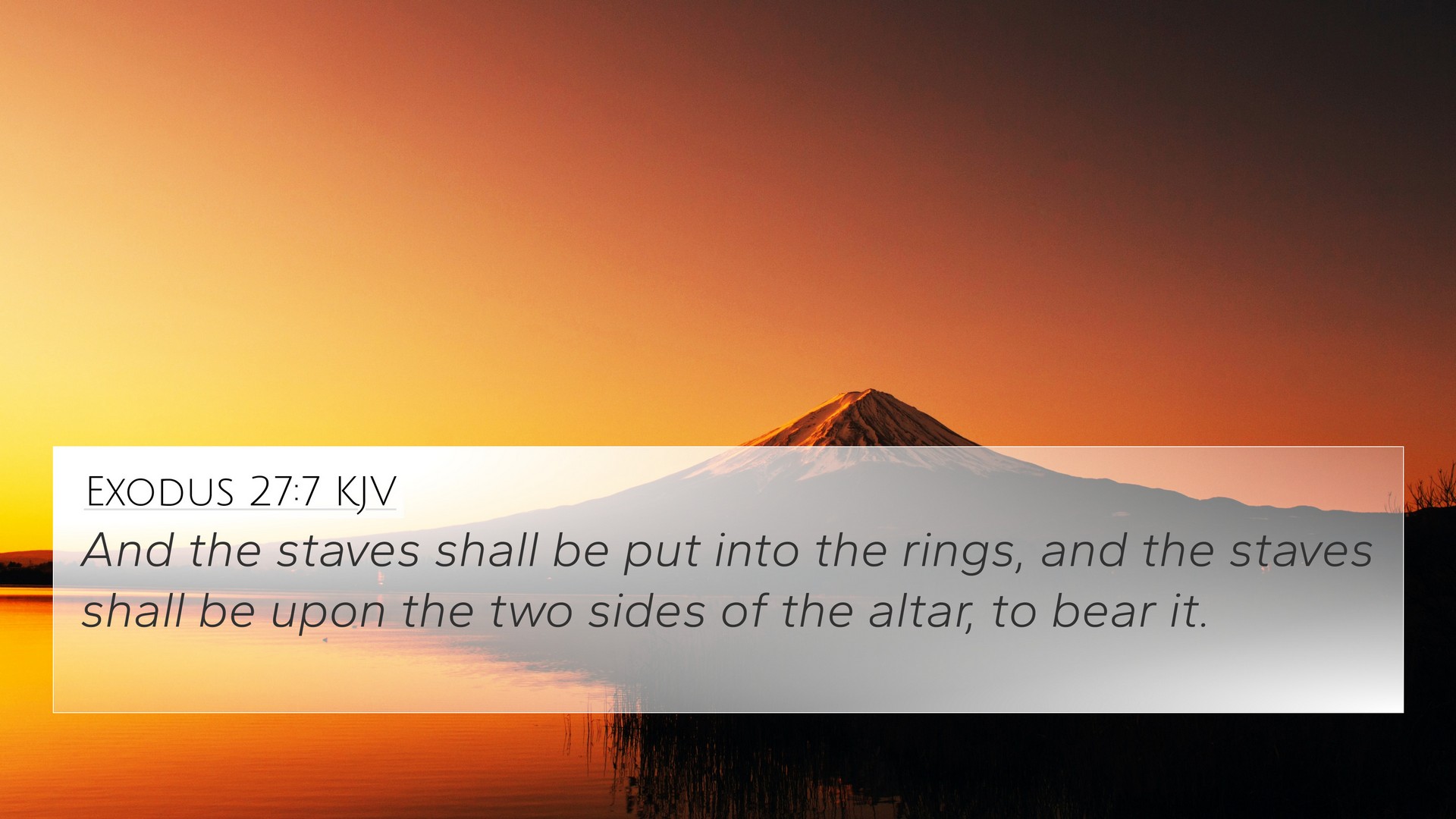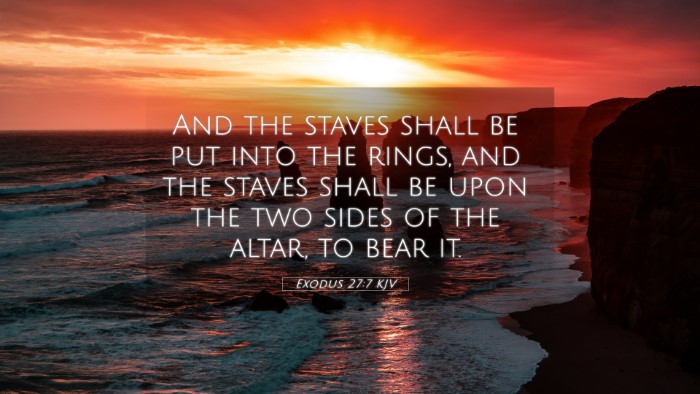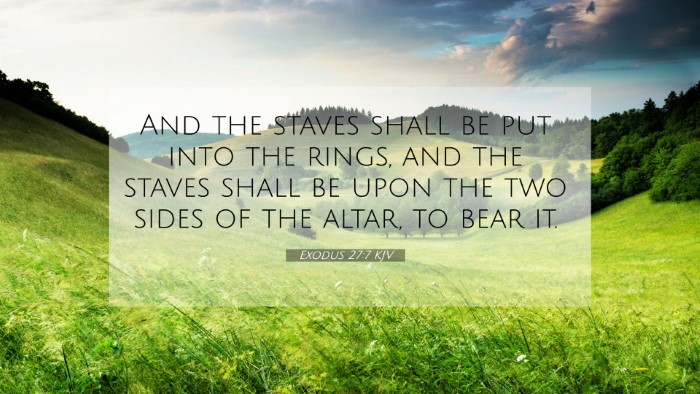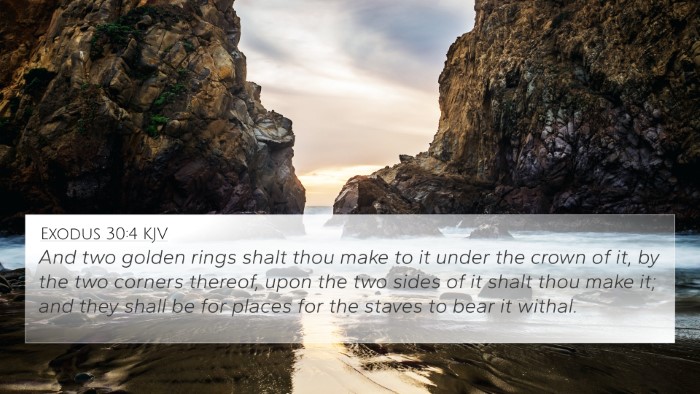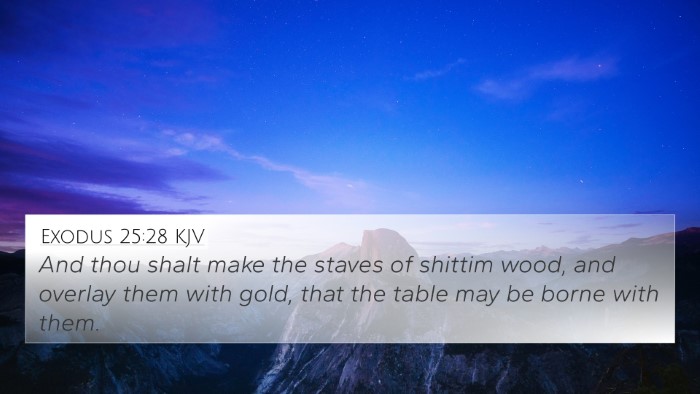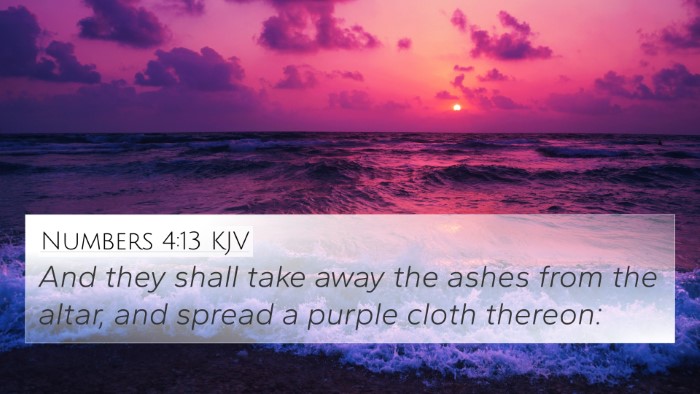Understanding Exodus 27:7
Exodus 27:7 states: "And two rings shall be made on it, under the crown of it, by the two corners thereof, upon the two sides of it shalt thou make it; and they shall be for the staves to bear it."
This passage belongs to the description of the design and construction of the altar used for offerings in the Tabernacle.
Each element in this verse has deep symbolic meaning and practical significance in the context of worship and God's instructions to His people.
Summary of Verse Meaning
The specifics of the altar’s design emphasize God's attention to detail in worship.
The rings and staves were crucial for transporting the altar, reflecting both the mobility of worship and the care with which the people should approach their relationship with God.
Insights from Public Domain Commentaries
-
Matthew Henry:
Matthew Henry highlights the significance of the rings and staves, indicating that they symbolize the readiness of God's people to offer sacrifices wherever they would go.
He emphasizes that the altar must be portable, allowing worship to accompany them in their journey through the wilderness.
-
Albert Barnes:
Barnes points out that the instructions given demonstrate God's desire for order and reverence in worship.
The details serve practical purposes while also pointing toward deeper spiritual truths about accessibility to God through sacrifice.
-
Adam Clarke:
Clarke illustrates how the altar serves as a central point for communion with God.
He stresses that having the means to carry the altar signifies the need for God’s presence to be portable in the lives of His people, enabling them to worship in diverse settings.
Bible Cross-References
To fully appreciate the meaning of Exodus 27:7, it is beneficial to explore Bible verse cross-references that relate to concepts of worship, sacrifice, and the Tabernacle’s setup.
Here are some important connections:
- Exodus 25:12 - Discusses the rings and staves used for the Ark of the Covenant, paralleling the connection of movement in worship.
- Exodus 29:37 - Focuses on the altar’s sanctification, linking its significance in making the space holy for offerings.
- Leviticus 1:7 - Details the priest's duties associated with the offerings, providing context to the purpose of the altar.
- Numbers 4:15 - Discusses the duties of the Levites in carrying holy items of the Tabernacle, reinforcing the transportable nature of worship.
- Hebrews 13:10 - References the altar in the New Testament context, emphasizing the spiritual sacrifices of believers.
- Matthew 5:23-24 - Highlights the importance of reconciliation before offering gifts at the altar, illustrating the relational aspect of worship.
- 1 Peter 2:5 - Compares believers to living stones, connecting the theme of personal sacrifice with worship.
Thematic Connections
The thematic Bible verse connections help to deepen understanding by highlighting how worship practices evolve from Old Testament to New Testament teachings.
- Worship and Sacrifice: Exodus 27:7 directly ties into the broader theme of sacrificial worship, which underscores the necessity of offerings in maintaining fellowship with God.
- God's Presence: The mobility of the altar signifies God's desire to be present with His people, a theme echoed throughout Scripture.
- Holiness and Order: The clear instructions for the altar's design resonate with the overarching Biblical narrative of approaching God in reverence and holiness.
- Transitional Nature of Worship: The movement from the altar of the Old Testament to the spiritual sacrifices of the New Testament illuminates the transformative nature of relationship with God.
Cross-Referencing Biblical Texts
Cross-referencing Bible study methods can provide deeper insights into understanding Exodus 27:7.
Utilizing tools for Bible cross-referencing helps to create an inter-Biblical dialogue that enriches comprehension.
This method encourages readers to explore the connections between texts, linking Bible scriptures across both Testaments.
How to Use Bible Cross-References
When approaching Exodus 27:7, consider the following:
- Identify keywords and themes from the verse.
- Utilize a Bible concordance or cross-reference guide to find related passages.
- Engage in a comparative Bible verse analysis to observe how other scriptures inform the meaning of the verse.
- Document insights and connections in a study journal for ongoing exploration.
Conclusion
Exodus 27:7 provides rich theological insights into the nature of worship and how the Israelites were instructed to approach God.
By understanding the significance of the rings and staves on the altar, readers can appreciate the continuous need for accessibility to God's presence through sacrifice.
The exploration of cross-references allows for a deeper connection within the Biblical narrative, showcasing God's unchanging nature in covenant and worship.
